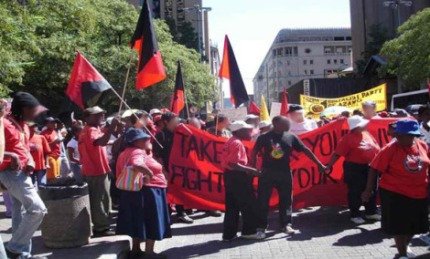 by Siyabulela Hulu-Hulu (TAAC, ZACF)
by Siyabulela Hulu-Hulu (TAAC, ZACF)
It is said we live in a democratic country; but, believe me it is for the chosen few. Current Deputy President of South Africa, Cyril Ramaphosa, was once widely considered a hero of the working class. Today he is a hypocrite and traitor to us, the majority.
From 1994, when his career as a trade unionist ended and his career as a capitalist and state politician began, he has enriched himself at the expense of workers – he is a billionaire by the toil of our mothers, fathers, brothers and sisters.
Ramaphosa played a major role in the National Union of Mineworkers (NUM), in the Congress of South African Trade Unions (COSATU) and in the negotiations leading to the 1994 breakthrough. He became African National Congress (ANC) secretary-general in 1991 and ANC deputy president in 2012 – the ally of President Jacob Zuma.
In the years between, his business empire has grown massively. His interests now include a big stake in the Lonmin platinum mines; he is implicated in the 2012 Marikana Massacre of striking miners near Rustenburg. As a result, he had to testify at the Farlam Commission in Centurion, Tshwane, which recently ended.
This makes me wonder what kind of democracy and equality he was fighting for. He was a hero of the anti-apartheid struggle, but is now a villain of the parliamentary democratic period. He is covered with an indelible and negative stigma amongst the majority of South Africans.
But one may not be surprised: even his leader and ally, Jacob Zuma, runs the state with filthy hands, part of the large group of corrupt state officials and capitalists that loots our country.
In conclusion, all these so-called leaders are wolves in sheep’s clothing. And all that glitters, dear readers, is not gold! Parliament, rather than being a solution, is a place where the wolves come out to feast. This system of hierarchical rule always changes those people who join it. It is up to us, the working class majority – employed and unemployed – to change the system. Anarchism shows us the way.
 The Way Forward for South Africa:
The Way Forward for South Africa:






 by Bongani Maponyane (TAAC, ZACF)
by Bongani Maponyane (TAAC, ZACF)
 The Tokologo African Anarchist Collective supports the protest march held by members of the Khutsong community – where we have active members – to the Merafong municipal offices.
The Tokologo African Anarchist Collective supports the protest march held by members of the Khutsong community – where we have active members – to the Merafong municipal offices.